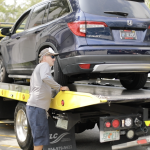
RVing is a great way to see amazing sights across the continent but getting the most out of your RV experience takes a bit of preparation. Along with the swimsuits, sunscreen, and beach towels, there are a few more serious items you should check off your to-do list before embarking on your journey. Knowing exactly how much you can weigh and how much you can tow is essential before you depart. This can impact your gas mileage, roads you can travel on, and can drastically alter plans if you are not prepared.
How Much Can an RV Tow?
Depending on the overall size of the engine and vehicle, RVs typically can pull anywhere up to 15,000 pounds, but may not be able to pull anything at all. This information is going to be in several, easy-to-find places. Owner’s manuals, the tire pressure plate inside the driver’s door, and various online calculators all have ways to figure out how much your specific RV can tow. Oftentimes, this weight is also influenced by how much your overall vehicle weighs, so if you are carrying a heavy load inside the RV, pulling weight behind might not be an option.
How Does It Affect Your Mileage?
Most standard RVs average about 10 miles to the gallon. As a general rule, the larger the rig, then the more fuel it consumes. Any weight that is added to the RV such as supplies, people, or water, will alter that original gas mileage. If you plan on towing, know that towing substantially decreases fuel economy. The weight and any wind resistance will both contribute to decreasing the gas mileage.
Things You Can Do to Improve Your Mileage
Proper prior planning is always the best course of action when thinking about a trip, and gas mileage is no different. Even before heading out on a journey there are a few things to do in order to keep gas mileage up. Making sure the RV is up to date on maintenance is the first step. Tune-ups, if needed, air filters, emissions, and tire pressure are all important factors in gas mileage. A good mechanic that specializes in RVs will be most helpful in this preparation. Once you have hit the road you can help stretch the gas mileage by using the cruise control to help keep a consistent speed, using overdrive when possible to help decrease the engine speed, and not idling for long periods of time are all great ways to stretch gas mileage.
As with any trip, an RV trip comes with preparation and planning. Making sure you are prepared for more technical details like gas mileage and weight may seem daunting, but there are several easy places to find information and simple steps you can take to help stretch that gas mileage.
While your RV is capable of towing a lot, it might not be the easiest or most cost-effective option for transporting an extra vehicle. Talk to Direct Connect Auto Transport about car shipping and other ways that we can help you!





Comments by Direct Connect Auto Transport